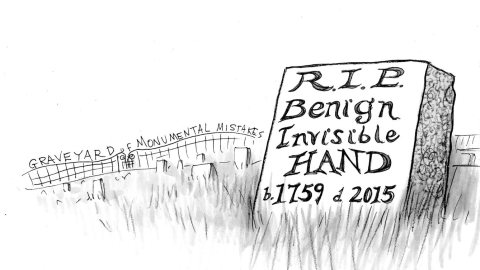Is Economics Built On A “Monumental Mistake?”

This is diablog 8 between David Sloan Wilson (DSW) and me (JB).
1) JB: You’ve called an idea that’s cherished in economics “a monumental mistake.” Specifically, the belief that Adam Smith’s “invisible hand” ensures markets self-organize for the best overall outcomes.
2) JB: Biological self-organization — Darwin’s “invisible hand” — often delivers disaster. What can self-organization, or spontaneous order, in biology teach economics?
3) DSW: Self-organization isn’t intrinsically good (it can be functional or dysfunctional).
4) DSW: It is indeed a monumental mistake to think that unbridled self-interest will robustly benefit the common good. Instead, it can cause dysfunctional self-organization.
5) DSW: Nevertheless, biology provides breathtaking examples of invisible hand self-organization. Multicellular organisms and social insect colonies work beautifully as multi-agent societies without their members having the welfare of their society in mind. We can say that confidently because cells and insects don’t even have minds in the human sense!
6) DSW: Self-organization leads to group-functional outcomes in these examples because the group is the unit of selection. Lower-level behaviors that work well at the group level are winnowed from the much larger set of behaviors that don’t work. But when biological systems are not units of selection, e.g., most ecosystems, they don’t function well as units, as you correctly say.
7) DSW: Like bodies and beehives, human groups function well to the degree that their properties have been winnowed by between-group selection. [Friedrich] Hayek saw this evolutionary aspect of economics, but few understand it correctly.
8) DSW: The bottom line: Spontaneous order worth wanting is possible, but it must be selected. That sounds contradictory, but it makes perfect sense, evolutionarily.
9) JB: I get that that’s how it works in biology. But economists, despite sometimes using biology-like language, are mainly physics-like thinkers. And spontaneous order in physics isn’t “selected.”
10) DSW: You’re right. Economists will never get it right until they switch their mentality from physics to evolution (see Newton pattern vs. Darwin pattern).
11) JB: Robert Frank’s The Darwin Economy distinguishes two “invisible hand” types. Sometimes individual incentives combine to generate good group outcomes. Sometimes they undermine group goals. Bad invisible hands create spontaneous disorder, which local incentives can’t cure (see Markets Dumb As Trees?).
12) DSW: Exactly. Incentives are like mutations. For every one that works, many are counterproductive.
13) JB: Smith’s invisible hand claims selfish incentives have the unintended consequence of group-level benefits. But Darwin’s invisible hand shows they often don’t. Meanwhile markets shouldn’t be interfered with, because of bad “unintended consequences.”
14) DSW: Oddly muddled. Complex systems always include indirect effects (which public policy must monitor and mitigate).
15) JB: Perhaps economists believe people wouldn’t knowingly damage their own long-term interests. But empirically people do, often (sometimes encouraged by economists).
16) DSW: An evolutionary or empirical/behavioural perspective would never make that error.
17) JB: And unlike the rest of biology, humans aren’t limited to mindless random trial and error and “selection.” Our evolved learning, foresight, and coordination abilities mean we can intelligently guide systems away from ruin (vigilantly adjusting to mitigate bad, unintended consequences).
18) DSW: True. But only if we can become wise managers of evolutionary processes.
Earlier diablogs covered: (1) evolution’s score keeping (relative fitness), (2) its built-in team aspects, (3) its self-destructive competitions, (4) its blind logic, (5) how division of labor complications, (6) why economics needs a version of evolution’s “inclusive fitness,” and (7) why whatever your politics, you need needism.
Illustration by Julia Suits, The New Yorker Cartoonist & author of The Extraordinary Catalog of Peculiar Inventions.





